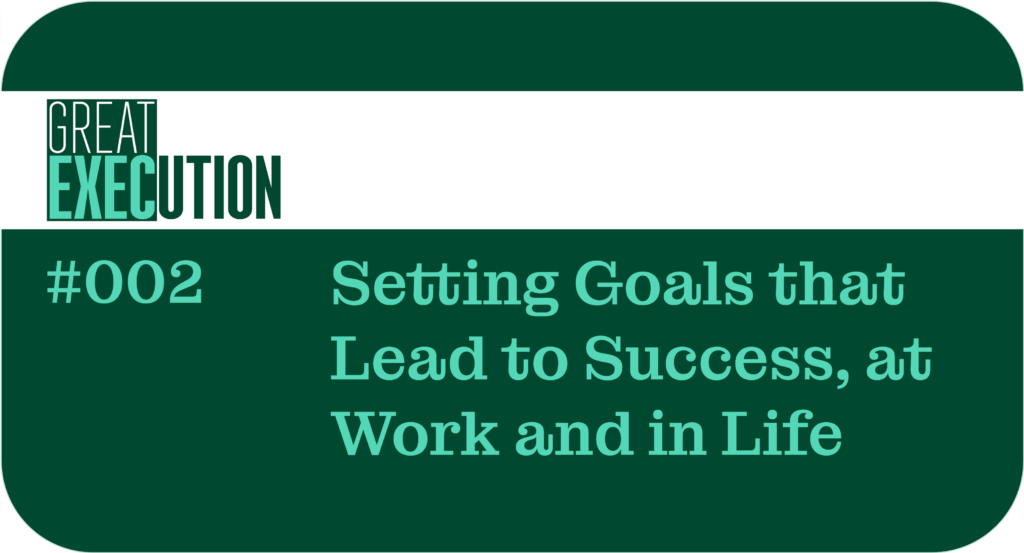Read time: 4 minutes
In this edition
Welcome to the latest edition of the Great Exec/ution newsletter.
Our focus this week is on goal setting. About a dozen years ago, I started setting personal and professional goals each year. At the time, I was probably overly ambitious and insufficiently focused, but I knew why I was doing it and I knew it was the right thing to do.
Over time I have learned a lot about how to create and pursue goals. That said, there have been years when I’ve done this better than others. I encourage you to set aside time to do this, both for work and for your own personal life.
Let me know what you think, and thank you for reading.
How to Set Goals that Lead to Success
We are approaching the time of year when people begin talking about New Year’s Resolutions. I am not a resolutions guy, but I am a goal setter across every single aspect of my life.
Why?
Because the older I get, the more complex my goals are to achieve and the longer it takes to achieve them. Gone are the days when hard graft and a little bit of luck will pull me through. In my teens and early 20s, goals were more straightforward—like securing a summer job or finding a date—and happened in a matter of weeks or months. These days, most of the things I want to achieve require multiple steps and focus across timeframes that are measured in years.
With that thought, here is how I approach goal-setting at work and in my personal life, with some examples of how you might integrate the approach for your own goals.
Steps to Creating Achievable and Important Goals
1. Articulate everything. I start by writing down everything I want to accomplish, no matter how big or small.
2. Define what success looks like. This helps in identifying indicators and measurable outcomes.
- Don’t aim to “grow revenue”, aim to “grow revenue by 40%”
- Rather than say “spend more time with family”, say “don’t work on Saturday”
3. Identify antecedent conditions. Map out the steps you need to get to your goal.
- If you want to lose weight, one way to do it is to not snack in between meals. So, maybe that means you need to stop grazing in the kitchen when you are working at home (my personal issue!)
- To introduce more automation in your work, you will need to define specifications for building technology that does the work. But that might also require rethinking how the work is done and sold to clients.
4. Understand time to impact. Assess the feasibility of your goals given your timeframe.
- Imagine you have a 5 million revenue target for 2024 for which you are hiring a new salesperson. Unless you’ve already got that person on board and trained up on January 1, you might wait anywhere from 3-6 months for her/him to start closing deals. Is that goal feasible?
5. Prioritize ruthlessly. Aim for what’s really important, and don’t overprogram yourself.
- Nearly every ambitious person I know overestimates her/his capacity for getting things done. While most of us have ways we can improve our productivity, we also underestimate the value of not being fully booked in life. Aim for the stuff that’s really important—things you will value 5-10 years from now that promote the thick desires in your life—and ignore the rest.
6. Make them achievable. If you are working on your personal goals, eliminate the ones that are not in your power, or change them to reflect things that are. If you are working on team goals, make sure you know who is going to achieve the goals—and that they know as well.
- “Getting promoted” is not in your power. But building skills, finding stretch assignments, and seeking a mentor are.
- “Securing funding” is complex process and a skill not many people have experience in. Will you find a banker? Who will find the banker? Who will create investor decks? Who works on the funding, and who works on the business?
7. Seek feedback and reflect. Share your goals with people you trust. Allow yourself a few weeks to process that feedback and ruminate on your goals before you lock them in.
Execution
Once you’ve set your goals, make sure you can deliver them.
1. Program time in your calendar NOW to work on them.
This may be as simple as blocking off two hours every Wednesday, or reorganizing your morning habits to open up space. Don’t wait to do this. It is far easier to find time in your calendar now to do something 2 months from now than it is to do something 2 days from now.
2. Program time in your calendar NOW to check in on progress.
Set a monthly meeting with yourself (60-90 minutes) to reflect on your goals, adjust your approach, identify opportunities and threats, and so on.
Conclusion
Effective goal-setting and execution are not just about ambition or vision. They are about discipline, clarity, and a deep understanding of one’s capacities given the realities of time. They are also the best way to ensure that we put ourselves on a path to a more meaningful life, however we define it.
LinkedIn Roundup
Here are the things I talked about this past week on Linkedin.
- Monday – no post
- Tuesday – Seeking real, lived experience in an AI content world.
- Wednesday – You’re the dumbest person in the room.
- Thursday – You’re never too small to have management reports
- Friday – Please share this newsletter with people!
Here are all my posts on LinkedIn.
You can also read my articles on a host of topics related to leadership and execution at my website.

